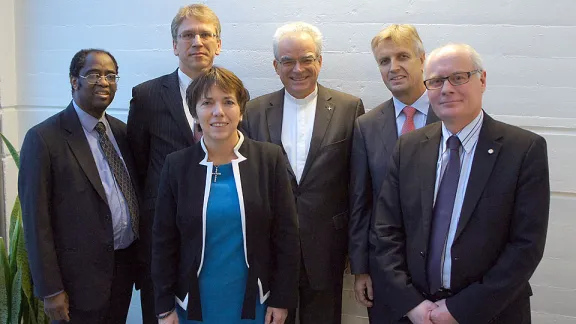
The EKD delegation visit to the Ecumenical Center in Geneva: (left to right) Rev. Dr Setri Nyomi (WCRC); Rev. Dr Olav Fykse Tveit (WCC); Rev. Dr Margot Kässmann (Special Envoy Reformation Jubilee); Bishop Martin Schindehütte (EKD); Rev. Martin Junge (LWF) and Oberkirchenrat Norbert Denecke (LWF-GNC). © LWF/H. Martinussen
LWF in Discussions with EKD Delegation during Geneva Visit
A delegation of the Evangelical Church in Germany (EKD) visiting the Ecumenical Center in Geneva on 28 November upon invitation by The Lutheran World Federation (LWF), shared plans with global church organizations about preparations for the 500th anniversary of the Reformation in 2017.
In Germany, the cradle of Reformation, preparations for the Reformation anniversary have been going on for some years now.
Bishop Martin Schindehütte who is responsible for EKD’s ecumenical relations and ministries abroad, noted that the ecumenical dimension of the Reformation still needs to be strengthened in the German Protestant church body. He called on the LWF, World Communion of Reformed Churches (WCRC) and the World Council of Churches (WCC) and all present at the meeting to assist the German churches in making the ecumenical dimension central in preparations for the Reformation anniversary.
The delegation included Rev. Dr Margot Kässmann, EKD special envoy for the 2017 Reformation Jubilee and Oberkirchenrat Norbert Denecke, general secretary of the LWF German National Committee (GNC).
The LWF is in ongoing dialogue with member churches and with ecumenical partners to explore what is being planned in different organizations and how best it can serve its member churches on the road toward the Reformation anniversary. Discussions with the EKD delegation were part of this process.
A central principle for the LWF in approaching the anniversary is that Reformation is a global citizen and that the anniversary needs to be approached in its policentricity.
“When you go to different churches around the world they will speak of different places and people of Reformation in their particular region. I hope that the EKD can harvest what is coming back to the cradle of Reformation from its travel to different corners of the world and that this harvest may enrich German churches as they approach the Reformation anniversary,” said LWF General Secretary Rev. Martin Junge at the meeting.
Junge said the LWF is currently exploring and planning how best to celebrate the Reformation anniversary in a way that recognizes the global aspect of Reformation, the ongoing relevance and gifts of Reformation, and that it is ecumenically accountable.
Kässmann said it was important in the anniversary preparations to explain to a wider public that this is not only a celebration for the church. “The Reformation message of freedom is also relevant for secular people,” she stressed.
She noted that in Eisleben, the town in Saxony-Anhalt where Luther was baptized, only seven percent of the population is Christian. In this secularized context churches need a language that resonates with people outside the church to tell them why the messages of Reformation are important, Kässmann added.
Representatives from the church organizations discussed dimensions of the Reformation anniversary and dialogued how to share these with the whole ecumenical movement. WCC General Secretary Rev. Dr Olav Fykse Tveit, himself a pastor in the Lutheran tradition, noted that “Being Lutheran is to have a strong call to be ecumenical … We are not failing when we recognize our failures. We have the opportunity to find true expressions of humility that can unite us.”
“The LWF Special Committee on 2017” is charged with providing the program framework for the LWF Reformation anniversary celebrations. The Committee will meet in early 2013 to finalize its recommendations from discussions and round-table meetings with member churches as well as with ecumenical partners. It will report to the LWF Council in June 2013. (609 words)


